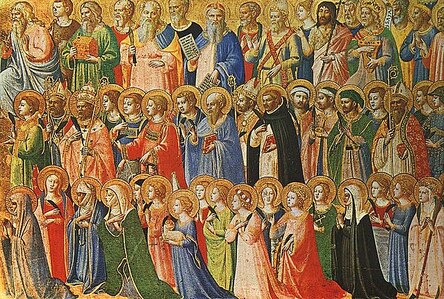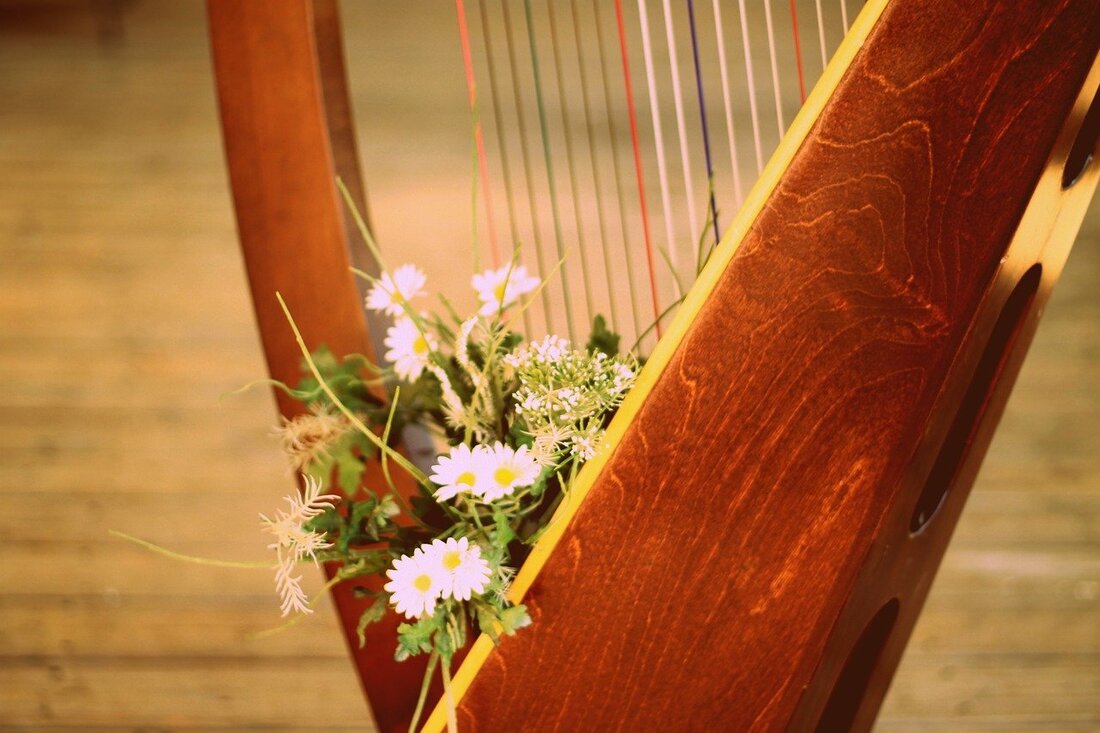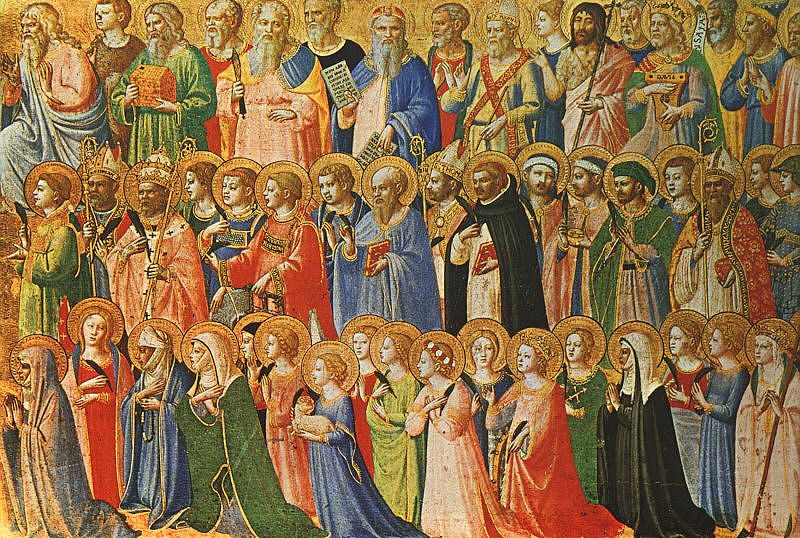|
Ovella Huddleston and cantor Lucas Jackson contribute the lush ambience of the low strings to the early morning worship service. Arrangements of works by Gustav Holst and Antonio Vivaldi will be offered on this day of remembrance.
At 11:00, the organ consoles those gathered with an "Elegy" by composer and a former Cincinnati colleague of mine Brenda Portman. During communion, the Chancel Choir offers the traditional Irish blessing in a serene setting by Bob Chilcott. The service concludes with an assured and triumphant meditation on the All Saints Sunday hymn "O What Their Joy and Their Glory Must Be."
0 Comments
Songs of peace, solace, and beatific glory on this Totenfest/All Saints Sunday morning.
At 9:00 a.m. vocalist/guitarist Bill DeMarco brings his classic folk stylings to a service of remembrance and hope. At 11:00 a.m., an ethereal and elegant "Elegy" by Brenda Portman greets worshipers at the Prelude. The Chancel Choir offers the ancient Latin text "Dona Nobis Pacem" (grant us peace) in a contemporary exquisite setting by David Lantz III with violinist Harmony Tucker and handbell ringers Eric Siegel and Roger Smith joining. The organ concludes the service with a triumphant 16th century "Glorificamus" from British composer John Redford. Join us this Totenfest/All Saints' Sunday as we remember those who have died this past year.
Harpist Alaina Bongers and flutist Rebecca Quillen offer songs of solace and peace by composers William Mahan, Bernard Andrès, and an arrangement of the gospel hymn "His Eye Is on the Sparrow" by Alaina. The Chancel Choir sings a paraphrase of Psalm 23 in Lloyd Larson's setting of "My Shepherd Will Supply My Need" accompanied by piano, flute, and textural flourishes from the harp.  By bertvthul - https://pixabay.com/photos/the-road-beams-path-forest-nature-815297/, CC0, https://commons.wikimedia.org/w/index.php?curid=82446002 By bertvthul - https://pixabay.com/photos/the-road-beams-path-forest-nature-815297/, CC0, https://commons.wikimedia.org/w/index.php?curid=82446002 Music and words are intrinsically linked: one describes the other. Creatives and lovers of music and poetry have known this for centuries. I would say that we all experience this powerful relationship, consciously or not. So for this week, there will be no musicological descriptors of the music you'll hear this All Saints' Sunday but rather these— words. Harpist Alaina Bongers and flutist Rebecca Quillen bring the evocative titles "Willow Weeping in the Wind" and "Autumn Shadows" to life this Totenfest Sunday morning: a day when we remember loved ones who have passed on to the communion of saints, walking roads we can only imagine. The Stephen Paulus choral work, "The Road Home," comes to mind after writing the preceding paragraph. The poet Michael Dennis Browne collaborated with Paulus on this cherished anthem and described the genesis of the beautiful prose: "I thought of the speaker as a persona rather than myself...I was also trying to suggest the consolation that can come to someone of faith, in times of great stress, as a result of prayer and an abiding belief in divine mercy." Allow these words to bring you solace, and hope, during these anxious days. The music will follow... Tell me, where is the road
I can call my own, That I left, that I lost So long ago? All these years I have wandered, Oh when will I know There's a way, there's a road That will lead me home? After wind, after rain, When the dark is done, As I wake from a dream In the gold of day, Through the air there's a calling From far away, There's a voice I can hear That will lead me home. Rise up, follow me, Come away, is the call, With the love in your heart As the only song; There is no such beauty As where you belong; Rise up, follow me, I will lead you home.  By Fra Angelico - Originally from en.wikipedia; description page is/was here. Transfer was stated to be made by User:richardprins, Original uploader was Sampo Torgo at en.wikipedia, Public Domain, https://commons.wikimedia.org/w/index.php?curid=3000363 By Fra Angelico - Originally from en.wikipedia; description page is/was here. Transfer was stated to be made by User:richardprins, Original uploader was Sampo Torgo at en.wikipedia, Public Domain, https://commons.wikimedia.org/w/index.php?curid=3000363 Music and text connoting peace, eternal light and life, and the Church Triumphant will be presented this Totenfest and All Saints' Sunday morning. An elegy can be defined as a lament for the dead, a sad poem. This literary term, as with many other literary terms, have musical counterparts as well. Such an example is the meditative "Elegy" by George Thalben-Ball, his most well-known work. It was conceived during a live religious service broadcast on BBC radio during World War II. The service ended earlier than planned and so he improvised a piece which, due to interest by listeners, was reconstructed and published as "Elegy". And so this Sunday's services begin in an introspective space as we remember those who have passed on over the year. For the closing voluntary, a joyous setting of the hymn tune "Lasst uns erfreuen" (Let us rejoice most heartily) reminds us of the bliss that awaits. The tune has been paired with several texts over the centuries. Our Doxology this fall is an example as are the hymns "Ye Watchers and Ye Holy Ones" and "All Creatures of Our God and King." On this special Sunday of the liturgical year, we will also hear two choral offerings by two of Plymouth's vocal ensembles. The Chamber Choir, an auditioned group of Plymouth members and fine vocalists from the community, offer the sublime "Illuminate (Lux aeterna)" by Matthew Wheeler at both morning services. The anthem was composed in memoriam to his father and expresses a journey from the shadows of despair to the promise of Light's return. "Lux aeterna" (Latin for "perpetual light") and additional select texts from the traditional requiem mass are interwoven into the English text creating a tapestry of personal feelings of loss and hope with an ancient liturgical underpinning. At 11:00, the Chancel Choir sings "We Are Surrounded" by Joseph Martin. The words by J. Paul Wiliams, based on Hebrews 12.1-3, call us to heed the will of God as those saints before us have done so well. At 6:00 p.m., join us for a service of simplicity and peace as we share a humble meal together and sing chants from the Taizé tradition. Bobby and Blair are joined by flutist Aaron McGrew for this beautiful service of evening prayer. Elegy, a beautiful work by composer and organist Brenda Portman will begin our morning Totenfest and All Saints Sunday observances. Brenda was a colleague of mine at the Cincinnati College-Conservatory of Music and currently an Adjunct Organ Instructor at Xavier University and Resident Organist at Hyde Park Community United Methodist Church of Cincinnati. An elegy in musical terms is a somber or ethereal work similar to the literary meaning, a lament for those that have passed on. A toccata on the hymn tune THINE by James Biery serves as the postlude. Thine the Amen Thine the Praise was composed by Carl Schalk and written by Lutheran pastor Herbert Brokering. This words from the last verse is especially poignant this Sunday, "Thine the glory in the night No more dying only light...Thine the splendor Thine the brightness only Thee only Thee." The Chancel Choir will offer Celtic Song of Farewell, arranged by Steve Schaubel from a choral setting by Jeffrey Honoré, at the 11:00 service. The text is based on In Paradisum (Latin for 'Into Paradise'), the antiphon traditionally sung by the choir during a Requiem Mass as the body is taken from the church. The tune is set to the ancient Irish melody Londonderry Air, commonly known as "Danny Boy".
At 6:00, we will present a special Evening Prayer service inspired by the Anglican Evensong tradition. The original service is compiled from the traditional offices of Vespers and Compline with rubrics already enshrined in The Book of Common Prayer of 1549. Evensong is a service of sung prayer which, offered daily, the entire psalter could be read in a month's time and the entire bible in a year. In gathering together this Sunday evening, we join our voices in prayer to thank God for the day that has passed and ask for safekeeping through the night as we also remember those that have passed on. Evensong is also known for its embrace of quality music-making and the tradition of composers creating repertoire specifically for this liturgy. The two New Testament canticles Magnificat (Song of Mary, Luke 1.46-55) and Nunc dimitttis (Song of Simeon, Luke 2.29-32) have traditionally been sung at these evening services. The Chancel Choir will offer Magnificat and Nunc Dimittis in G Major by renowned Anglican composer Charles Villiers Stanford as well as present an Anglican Chant of Psalm 146. The anthem during communion will be Lux aeterna from Maurice Duruflé's Requiem (1948). The movement is intended to be sung during communion in a traditional Requiem Mass and states these words of comfort, "May light eternal shine upon them, O Lord, with thy saints for evermore." Organist Hannah Walters, Administrator of Music and Education at Peace With Christ Lutheran Church in Fort Collins, will accompany the choir. Arrive early for a time of reflection and meditation as I offer Widor's Choral from his tenth organ symphony, the Symphonie romane. Choral, as is the entire symphony, is based on the Gregorian Chant Haec Dies (translated as 'This Day'), an antiphon prescribed for the Easter Day Gradual and based on Psalm 118 (This is the day the Lord has made). Organist Hannah Walters will lead us joyfully into the night with Dietrich Buxtehude's Prelude, Fugue, and Chaconne. |
Details
|





 RSS Feed
RSS Feed